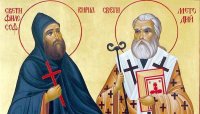
 Cyril and Methodius - educators of the Slavs, creators of the Slavic alphabet. They were brothers, born and raised in the Byzantine city of Thessaloniki (modern Thessaloniki), in the vicinity of this city at that time there lived a large Slavic population, so from childhood they knew one of the Slavic languages.
Cyril and Methodius - educators of the Slavs, creators of the Slavic alphabet. They were brothers, born and raised in the Byzantine city of Thessaloniki (modern Thessaloniki), in the vicinity of this city at that time there lived a large Slavic population, so from childhood they knew one of the Slavic languages.The main sources for studying the activities of Cyril and Methodius are their lives, which were written by students after the death of the brothers. According to these lives, Methodius in his youth made an administrative and military career and was the governor of a Byzantine principality with a Slavic population. Around 852 he took monastic vows and later became abbot. Already at a young age, Cyril showed outstanding linguistic abilities and a thirst for science; he studied in Constantinople with the greatest scientists of that time - Leo the Grammar and Photius (the future patriarch). After studying, he also accepted the priesthood, taught philosophy, and took part in the Byzantine embassy to the Arabs. Around 861, both brothers, as part of the Byzantine embassy to the Khazar Kaganate, visited Chersonesos twice, then were sent by Emperor Michael III to Great Moravia.
Great Moravia in the 9th century was one of the largest states in Central Europe; the central regions of the state were Moravia proper and Western Slovakia, it also included part of the Czech Republic, Lesser Poland, Lusatia; the capital of Great Moravia was the city of Velehrad (in the area of modern Bratislava). This mission was organized at the request of the Moravian prince Rostislav (846 - 879), who sought to limit the influence of the German clergy in his principality and wanted Christian teaching to be preached in a language understandable to the Slavs, and not in Latin. Cyril and Methodius translated the books of the Holy Scripture from Greek into the Slavic language; the translation was based on the Eastern Bulgarian dialects well known to them.
Unlike other methods of recording Slavic speech practiced in that era, the Slavic letter of Cyril and Methodius was a special complete system, created taking into account all the specific features of the Slavic language. They created a special alphabet for translation texts - the Glagolitic alphabet. The brothers also taught local clergy to perform divine services in Slavic. This experience spread to neighboring lands inhabited by the Slavs.
As a result of the translation activities of Cyril and Methodius, a corpus of texts in the Slavic language was created, which gave an idea of the basic norms of the Christian world; at the same time, a literary language was created, capable of serving all spheres of Slavic life at the same high level as Greek and Latin society.
After the death of Cyril, Methodius continued his educational activities, and after his death the students of both brothers were expelled from Great Moravia. Kliment Ohridski, Naum, Angelarius found refuge in neighboring countries, primarily in Bulgaria, where the Cyrillic alphabet was supposedly created. Through Bulgaria, the Cyril and Methodius heritage had a huge impact on the culture of Rus', Serbia, the Czech Republic and Croatia.


